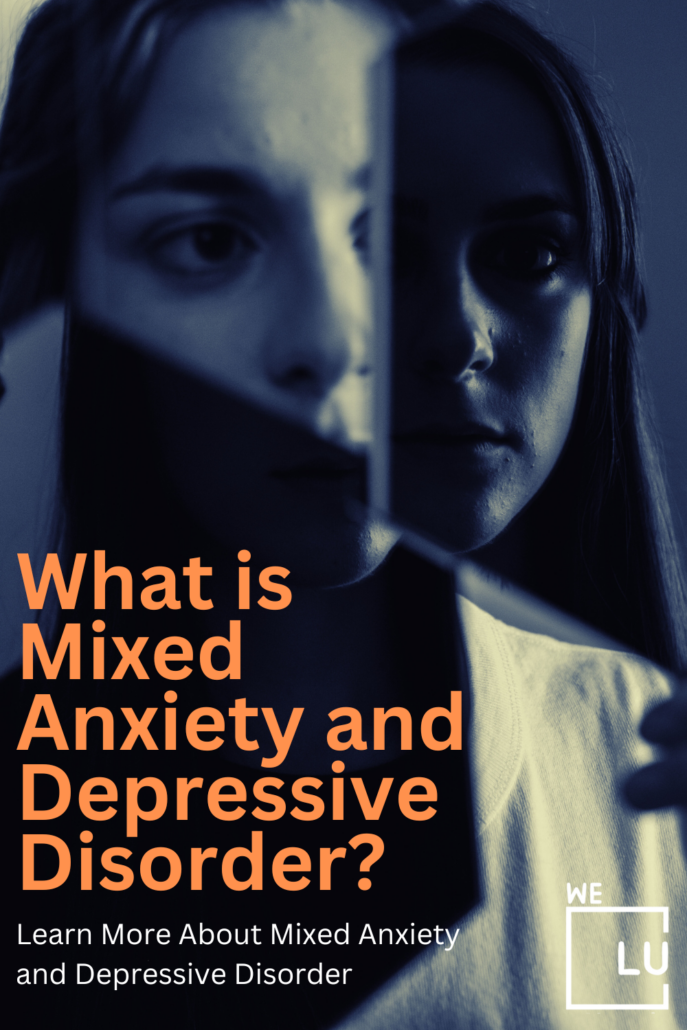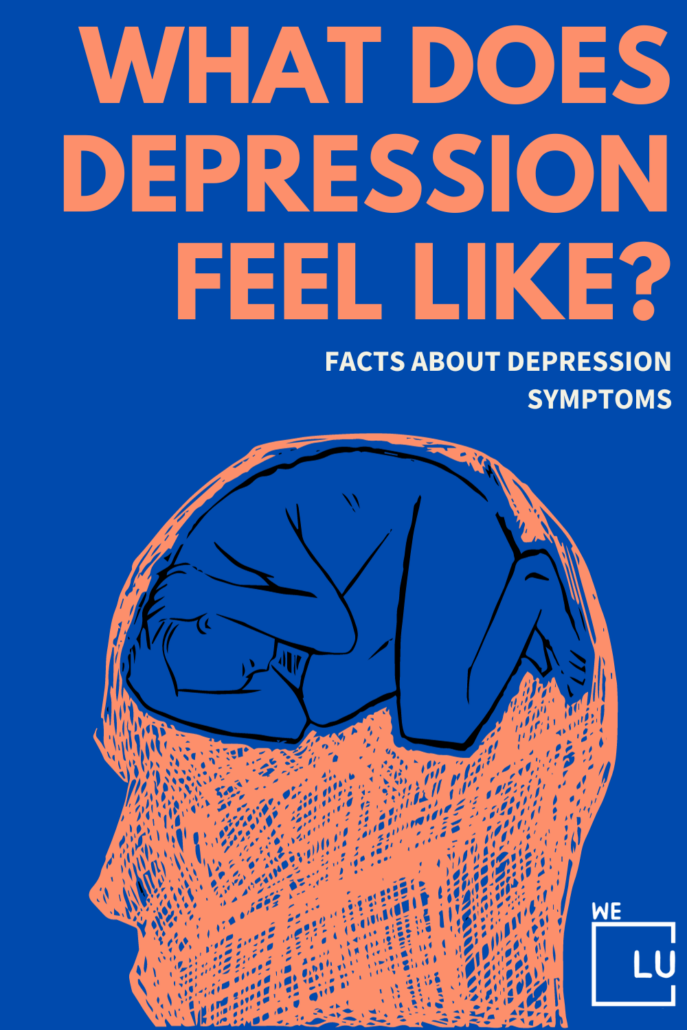It can be hard to deal with both depression and anxiety simultaneously. Along with the pain that these feelings cause, you also have to deal with the difficult situations that made them happen in the first place.
It’s normal to feel sad or worried when bad things happen; these feelings are a normal part of life. But there are times when sadness and fear are too much to handle. These feelings could get very strong, last longer than we thought they would, or come on suddenly, leaving us unsure of where they came from. The information here about anxiety and depression might help you if you feel like your sadness and stress are affecting your health and making it hard for you to enjoy life.
What is Mixed Anxiety and Depressive Disorder?
People who have Mixed Anxiety and Depressive Disorder, or MADD, can find it very hard to deal with things. The disorder is a complicated mix of anxiety and depression symptoms, and people who have it often feel like their emotions are going all over the place. It can be challenging to fight between intense worry and deep sadness.
While it’s normal to feel anxious and sad sometimes, MADD is different because these feelings last for a long time and get in the way of your daily life and health. There is help and understanding out there for people who are dealing with MADD. Don’t forget that you’re not alone in this and can get help to heal and get better.
What is Anxiety Disorder?
The National Institute on Mental Health says that having periods of worry is a normal part of life. You might feel anxious when you have a problem at work, before a test, or before making a very important choice. Anxiety illnesses, on the other hand, are more than just occasional fear or dread.
The main difference between anxiety and depression is that anxiety doesn’t go away and can get worse over time, so it’s important to get help for anxiety as soon as possible. The signs could make it hard to do normal things like work, school, or connect with others. Anxiety disorders come in many forms, such as generalized anxiety disorder, panic disorder, and several disorders linked to phobias.
What is Depression?
The National Institute of Mental Health says that depression, which is also called Major Depressive Illness or Clinical Depression, is a relatively common but severe mood condition. It causes severe symptoms that make it hard to do everyday things like sleep, eat, and work. Before someone can be diagnosed with sadness, they must show signs of it for at least two weeks.
Depression needs to be treated when the symptoms last for a long time and don’t go away. This is because different types of depression are a little different and can show up in strange scenarios.
What Are The Symptoms of Mixed Anxiety & Depressive Disorder?
| Physical Symptoms | Psychological Symptoms |
|---|---|
| Fatigue | Constant worry |
| Headaches | Persistent sadness |
| Muscle tension | Irritability |
| Rapid heartbeat | Difficulty concentrating |
| Nausea | Fear of the future |
| Digestive issues | Feelings of hopelessness |
| Restlessness | Low self-esteem |
| Insomnia | Loss of interest in activities |
| Sweating | Guilt or self-blame |
| Shortness of breath | Thoughts of self-harm |
| Dizziness | Anxiety about physical health |
| Trembling or shivering | Pervasive negative thoughts |
| Palpitations | Social withdrawal |
| Fidgeting | Difficulty making decisions |

Skip To:
Learn More:
- High Functioning Anxiety Symptoms, Causes, & Treatment. What Is High Functioning Anxiety?
- Depression and Anxiety Therapist Fort Lauderdale. EMDR Therapy Fort Lauderdale.
- Learn the Different Types of Anxiety. 6 Types of Anxiety Disorders. Symptoms and Medications for the Different Types of Anxiety.
- Performance Anxiety, Causes, Symptoms, and Treatment. Male Performance Anxiety Solutions.
- How to Deal With Crippling Anxiety? Crippling Anxiety Symptoms, Causes, & Treatment
- Learn How to Cope with Depression. 10 Ways to Cope with Depression.
- What Is Mild Depression? Symptoms & Treatment
- Atypical Depression. What Is It? Symptoms & Treatment
- Guide to Situational Depression Symptoms, Causes, & Effective Treatment
- Unipolar Depression Definition, Causes, Symptoms, & Treatment
- Is Depression Genetic? Depression is Genetic Evidence. Is Postpartum Depression Genetic? Is Bipolar Depression Genetic? Is Depression Genetic or Environmental?
Get Help. Get Better. Get Your Life Back.
Searching for Accredited Dual Diagnosis Mental Health Centers Near You?
Even if therapy failed previously, or are in the middle of a difficult crisis, we stand ready to support you. Our trusted behavioral health specialists will not give up on you. When you feel ready or just want someone to speak to about counseling alternatives to change your life call us. Even if we cannot assist you, we will lead you to wherever you can get support. There is no obligation. Call our hotline today.
FREE 24/7 Dual Diagnosis Mental Health Services Hotline
What Causes Mixed Anxiety Depressive Disorder?
The exact causes of Mixed Anxiety and Depressive Disorder (MADD) are not fully understood, as mental health conditions often result from a complex interplay of factors. However, several vital factors may contribute to the development of MADD:
- Biological Factors: Imbalances in brain chemistry and the functioning of neurotransmitters can play a role in MADD. Genetic factors may also increase susceptibility to this condition.
- Psychological Factors: Stressful life events, trauma, or ongoing stress can contribute to the development of MADD. Coping with difficult situations may lead to both anxiety and depressive symptoms.
- Personality Traits: Certain personality traits, such as perfectionism or a tendency to ruminate on negative thoughts, may increase the risk of MADD.
- Environmental Factors: A lack of social support, financial difficulties, or challenges in personal relationships can contribute to the onset of MADD.
- Physical Health: Some physical health conditions or chronic illnesses may exacerbate symptoms of MADD.
- Substance Abuse: Substance abuse, including alcohol and drug use, can both lead to and result from MADD.
What’s the Difference Between Anxiety and Depression?
| Aspect | Anxiety | Depression |
|---|---|---|
| Primary Emotion | Excessive worry, fear, or unease | Overwhelming sadness, hopelessness |
| Focus of Concern | Future-oriented, often about potential threats or uncertainties | Past or present, often focused on perceived losses or failures |
| Physical Symptoms | Restlessness, muscle tension, rapid heartbeat, shortness of breath, sweating | Fatigue, low energy, changes in sleep patterns, changes in appetite and weight |
| Cognitive Symptoms | Excessive worrying, racing thoughts, difficulty concentrating | Pervasive sadness, feelings of worthlessness, difficulty making decisions |
| Emotional Response | Fear, apprehension, unease, irritability | Persistent sadness, loss of interest or pleasure, emotional numbness |
| Behavioral Symptoms | Avoidance, fidgeting, seeking reassurance, repetitive behaviors | Social withdrawal, decreased activity, neglect of responsibilities |
| Duration | Often episodic, symptoms related to specific stressors or situations | Longer-lasting, typically lasting for weeks or months |
| Triggers | Often triggered by perceived threats, stress, or specific phobias | May be triggered by life events, but can also occur without apparent cause |
| Treatment Approach | Cognitive-behavioral therapy (CBT), exposure therapy, relaxation techniques | Cognitive-behavioral therapy (CBT), psychotherapy, medication (antidepressants) |
| Prevalence | Common, affecting millions of people worldwide | Common, with a significant global impact |
Shared Symptoms of Mixed Anxiety and Depressive Disorder
You should know that people who have depression, anxiety, or both may not have the same symptoms. However, the symptoms of these two disorders often overlap. Mixed Anxiety and Depressive Disorder (MADD) is characterized by several symptoms that are often seen together:
- Alterations in Sleep Patterns: Both anxiety and sadness can make it hard to fall asleep or stay asleep, or they can cause changes in the way you sleep.
- Levels of Energy: People with MADD may have times when they are nervous or agitated (anxiety) and times when they are tired and have little energy (depression).
- Increased Irritability: People with MADD may become more irritable or easily upset, often responding strongly to small things that set them off.
- Problems with Memory, Focus, and Concentration: Cognitive functions can be harmed, making it hard to remember things, focus, concentrate, and make choices.
- Unexplained Physical Symptoms: People with MADD may have aches, pains, or stomach problems that don’t seem to have a clear medical cause.
- Rumination: People with both anxiety and depression can experience rumination, which is a loop of negative, dark, or sad thoughts that they find hard to stop or control.
- Anxiety-Related Rumination: Thinking about bad things that might happen all the time or worrying too much, even when you can’t change your worries.

End the Emotional Pain. Get Your Life Back.
Feeling Depressed, Anxious or Struggling with Mental Health Illness? Get Safe Comfortable Mental Health Dual Diagnosis High-Quality Therapy From Counselors That Care. Begin Your Recovery Now.
Hotline (855) 940-6125MADD vs. Adjustment Disorder With Mixed Anxiety and Depressed Mood
“Adjustment disorder mixed anxiety and depression” is not the same thing as “Mixed Anxiety and Depressive Disorder.” There are some changes between these diagnostic groups:
Mixed Anxiety and Depressive Disorder (MADD): MADD, which is also called “cyclothymia,” is a diagnostic category for people who have both anxiety and depressive symptoms but don’t fully meet the standards for either an anxiety or depressive disorder. These signs may happen simultaneously, and the person may feel restless, anxious, sad, and lose interest in doing things.
Adjustment Disorder with Mixed Anxiety and Depressed Mood: This condition is more specific and is considered an adjustment disorder. It happens after a particular event or source of stress in life and includes both anxious and sad feelings. The main thing to note is that the symptoms are linked to a specific stressor, and they generally get better within six months of getting rid of it.
To sum up, MADD is a broader term for people who have both mixed anxiety and depressive symptoms but not the specific time-limited and stressor-related traits of Adjustment Disorder with Mixed Anxiety and Depressed Mood. A trained mental health worker is the only one who can make the correct diagnosis after carefully looking at a person’s symptoms and their situation.
First-class Facilities & Amenities
World-class High-Quality Mental Health Services & Behavioral Health Substance Abuse Treatment
Rehab Centers TourRenowned Mental Health Centers. Serene Private Facilities. Inpatient Rehab Programs Vary.
Mental Health Helpline (855) 940-6125Proven recovery success experience, backed by a Team w/ History of:
15+
Years of Unified Experience
100s
5-Star Reviews Across Our Centers
10K
Recovery Successes
- Comprehensive Dual-Diagnosis Treatment
- Complimentary Family & Alumni Programs
- Coaching, Recovery & Development Events
- Comfortable Onsite Medical Detox Center
Different Types of Adjustment Disorder Mixed Anxiety and Depression
The DSM-5 lists six types of adjustment disorders:
- Adjustment disorder with depressed mood: Symptoms include feelings of sadness, hopelessness, crying, and lack of joy from previous pleasurable things.
- Adjustment disorder with anxiety: Symptoms include feeling worried, anxious, and overwhelmed. You also have trouble concentrating. Separation anxiety is a dominant symptom in children.
- Adjustment disorder with mixed anxiety and depressed mood: Symptoms include feeling both anxious and depressed.
- Adjustment disorder with disturbance of conduct: Symptoms include behavioral issues such as acting rebellious, destructive, reckless, or impulsive.
- Adjustment disorder with mixed disturbance of emotions and conduct: Symptoms include anxiety, depression, and behavioral issues.
- Adjustment disorder unspecified: Symptoms include physical symptoms such as headaches, body aches, stomach aches, heart palpitations, or insomnia.

World-class, Accredited, 5-Star Reviewed, Effective Mental Health Dual Diagnosis Programs. Complete Integrated Inpatient Rehab with Free Post Discharge Therapy Planning.
CALL (855) 940-6125End the Emotional Pain Rollercoaster. Gain Stability & Happiness Through Recovery Treatment. Start Mental Health Counseling Today. Get Free No-obligation Guidance by Behaviroal Health Specialists Who Understand Mental Health Recovery.
Adjustment Disorder With Mixed Anxiety And Depressed Mood Treatment Plan
It might occasionally be more challenging to treat co-occurring depression and anxiety than one disorder on its own. Even if you receive treatment for one ailment, several symptoms may continue or interact.
For instance:
- You can’t stop thinking about how many things are going wrong in your life or how they might worsen. Your energy and motivation to keep trying eventually become depleted by these anxieties, leaving you feeling depressed and hopeless.
- You are unable to interact with people the way you would like to because of social anxiety. You want to meet new people, yet you usually avoid social situations. You are left feeling alone, depressed, and guilty as a result, especially when you consider the squandered possibilities, yet you are powerless to change anything.
A mental health care provider might suggest combining different treatment modalities because what reduces anxiety and depression symptoms may not always reduce depression symptoms and vice versa.
Potential remedies for depression and anxiety include:
Mixed Anxiety-Depressive Disorder Therapy
Therapy comes in a variety of forms and can be used to treat depression or anxiety.
For instance, interpersonal therapy for depression teaches you how to communicate effectively to express yourself and meet your emotional needs. Phobias are a sort of anxiety that can be treated using exposure therapy, a method that helps you become more at ease in dreaded situations.
Other methods are available to address both conditions:
- Cognitive behavioral therapy (CBT) teaches techniques to identify, challenge, and reframe unwanted thoughts and behavior patterns.
- Mindfulness-based cognitive therapy teaches mindfulness techniques along with behavioral techniques to help you begin to manage unwanted feelings and stay present through them instead of becoming overwhelmed.
- Acceptance and commitment therapy teaches strategies to accept unwanted or distressing thoughts, stay present, and commit to positive activities that fulfill your personal values.
- Problem-solving therapy. This approach teaches using coping skills to manage mental health symptoms and life experiences that cause stress and other emotional turmoil.
Mixed Anxiety and Depressive Disorder Medications
Additionally, psychotropic drugs can lessen the signs and symptoms of anxiety and depression. But because it doesn’t help you deal with the root of those symptoms, your physician or psychiatrist will typically advise therapy in addition to medication.
A therapist, such as a psychiatrist, might suggest:
- Antidepressants include selective serotonin reuptake inhibitors (SSRIs) and serotonin-norepinephrine reuptake inhibitors (SNRIs). In some cases, these medications may also relieve anxiety symptoms.
- Anti-anxiety medications: including benzodiazepines, buspirone (Buspar), and beta-blockers. These medications can ease anxiety symptoms but may not improve depression symptoms. Benzodiazepines also carry a high risk of dependence, so your prescriber may try other medications first.
- Mood stabilizers: These medications may help treat depression symptoms that don’t respond to antidepressants alone.
Experience Transformative Recovery at the We Level Up Treatment Center.
See our authentic success stories. Get inspired. Get the help you deserve.



Start a New Life
Begin with a free call to a behavioral health treatment advisor. Learn more about our dual-diagnosis programs. The We Level Up treatment center network delivers recovery programs that vary by each treatment facility. Call to learn more.
- Personalized Care
- Caring Accountable Staff
- World-class Amenities
- Licensed & Accredited
- Renowned w/ 5-Star Reviews
We’ll Call You
We Level Up Dual Diagnosis Treatment
The precise definition of “dual diagnosis,” also known as co-occurring disorders, can vary among institutions. In general, it refers to the concurrent treatment of an individual who has received diagnoses of both a substance use disorder and a mental health disorder.
Addressing dual-diagnosis clients constitutes a crucial element of our inpatient treatment program because co-occurring disorders are strongly associated with instances of substance abuse. Crafting a comprehensive treatment plan that encompasses the physical aspects of withdrawal, the psychological ties to substance use, and the management of underlying mental health conditions is fundamental to setting clients on the path to success.
A thorough mental health evaluation uncovers treatment possibilities. Collaborating with mental health counselors and medical professionals grants access to behavioral therapy and medication-based interventions.
At our dual diagnosis treatment center, We Level Up is committed to delivering top-tier care. We understand the intricate interplay of mental and substance abuse disorders and how they can perpetuate a cycle of addiction. We provide specialized dual-diagnosis treatment to offer clients the best prospects for genuine recovery and long-lasting well-being.
Acknowledging that you may be living with a mental illness can be challenging. Nevertheless, once it is accurately diagnosed and treated, addressing the co-occurring substance abuse issue becomes considerably more manageable. Only qualified medical professionals can diagnose these underlying conditions. Suppose you suspect that you are grappling with a co-occurring disorder alongside addiction. In that case, we strongly encourage you to seek a reputable treatment center to commence your journey to recovery. Contact We Level Up today.
8 Steps in Maintaining Your Mental Wellbeing
Search We Level Up FL Learn More About Mixed Anxiety and Depressive Disorder Resources
Sources
- Adjustment Disorders. In: Diagnostic and Statistical Manual of Mental Disorders. 5th ed. Arlington, VA: American Psychiatric Association; 2013.
- American Psychiatric Association. When Somebody Has an Adjustment Disorder. (https://psychnews.psychiatryonline.org/doi/full/10.1176/appi.pn.2016.1a18) Last published 1/4/2016.
- Bachem R, Casey P. Adjustment disorder: A diagnosis whose time has come (https://pubmed.ncbi.nlm.nih.gov/29107817/). J Affect Disord. 2018 Feb; 227:243-253.
- Casey P. Adjustment disorder: new developments (https://pubmed.ncbi.nlm.nih.gov/24748555/). Curr Psychiatry Rep. 2014 Jun; 16(6):451. Adjustment disorder with mixed anxiety and depressed mood ICD 10 Related articles
- Merck Manual, Consumer Version. Adjustment Disorders (https://www.merckmanuals.com/home/mental-health-disorders/anxiety-and-stress-related-disorders/adjustment-disorders). Last reviewed 8/2023. Mixed Anxiety and Depressive Disorder Related articles
- National Library of Medicine (U.S.). Adjustment disorder (https://medlineplus.gov/ency/article/000932.htm). Last reviewed 4/30/2022. Mixed Anxiety and Depressive Disorder Related articles
- O’Donnell ML, Agathos JA, Metcalf O, et al. Adjustment Disorder: Current Developments and Future Directions (https://pubmed.ncbi.nlm.nih.gov/31315203/). Int J Environ Res Public Health. 2019 Jul;16(14):2537. Mixed Anxiety and Depressive Disorder Related articles





